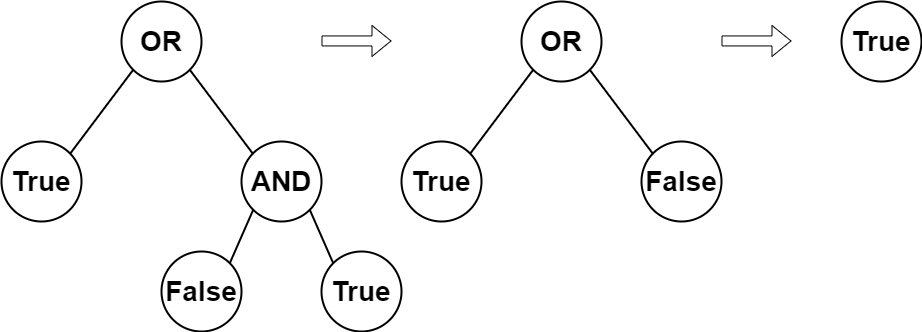Welcome to Subscribe On Youtube
2331. Evaluate Boolean Binary Tree
Description
You are given the root of a full binary tree with the following properties:
- Leaf nodes have either the value
0or1, where0representsFalseand1representsTrue. - Non-leaf nodes have either the value
2or3, where2represents the booleanORand3represents the booleanAND.
The evaluation of a node is as follows:
- If the node is a leaf node, the evaluation is the value of the node, i.e.
TrueorFalse. - Otherwise, evaluate the node's two children and apply the boolean operation of its value with the children's evaluations.
Return the boolean result of evaluating the root node.
A full binary tree is a binary tree where each node has either 0 or 2 children.
A leaf node is a node that has zero children.
Example 1:

Input: root = [2,1,3,null,null,0,1] Output: true Explanation: The above diagram illustrates the evaluation process. The AND node evaluates to False AND True = False. The OR node evaluates to True OR False = True. The root node evaluates to True, so we return true.
Example 2:
Input: root = [0] Output: false Explanation: The root node is a leaf node and it evaluates to false, so we return false.
Constraints:
- The number of nodes in the tree is in the range
[1, 1000]. 0 <= Node.val <= 3- Every node has either
0or2children. - Leaf nodes have a value of
0or1. - Non-leaf nodes have a value of
2or3.
Solutions
-
/** * Definition for a binary tree node. * public class TreeNode { * int val; * TreeNode left; * TreeNode right; * TreeNode() {} * TreeNode(int val) { this.val = val; } * TreeNode(int val, TreeNode left, TreeNode right) { * this.val = val; * this.left = left; * this.right = right; * } * } */ class Solution { public boolean evaluateTree(TreeNode root) { return dfs(root); } private boolean dfs(TreeNode root) { if (root.left == null && root.right == null) { return root.val == 1; } boolean l = dfs(root.left), r = dfs(root.right); if (root.val == 2) { return l || r; } return l && r; } } -
/** * Definition for a binary tree node. * struct TreeNode { * int val; * TreeNode *left; * TreeNode *right; * TreeNode() : val(0), left(nullptr), right(nullptr) {} * TreeNode(int x) : val(x), left(nullptr), right(nullptr) {} * TreeNode(int x, TreeNode *left, TreeNode *right) : val(x), left(left), right(right) {} * }; */ class Solution { public: bool evaluateTree(TreeNode* root) { return dfs(root); } bool dfs(TreeNode* root) { if (!root->left && !root->right) return root->val; bool l = dfs(root->left), r = dfs(root->right); if (root->val == 2) return l || r; return l && r; } }; -
# Definition for a binary tree node. # class TreeNode: # def __init__(self, val=0, left=None, right=None): # self.val = val # self.left = left # self.right = right class Solution: def evaluateTree(self, root: Optional[TreeNode]) -> bool: def dfs(root): if root.left is None and root.right is None: return bool(root.val) l, r = dfs(root.left), dfs(root.right) return (l or r) if root.val == 2 else (l and r) return dfs(root) -
/** * Definition for a binary tree node. * type TreeNode struct { * Val int * Left *TreeNode * Right *TreeNode * } */ func evaluateTree(root *TreeNode) bool { var dfs func(*TreeNode) bool dfs = func(root *TreeNode) bool { if root.Left == nil && root.Right == nil { return root.Val == 1 } l, r := dfs(root.Left), dfs(root.Right) if root.Val == 2 { return l || r } return l && r } return dfs(root) } -
/** * Definition for a binary tree node. * class TreeNode { * val: number * left: TreeNode | null * right: TreeNode | null * constructor(val?: number, left?: TreeNode | null, right?: TreeNode | null) { * this.val = (val===undefined ? 0 : val) * this.left = (left===undefined ? null : left) * this.right = (right===undefined ? null : right) * } * } */ function evaluateTree(root: TreeNode | null): boolean { const { val, left, right } = root; if (left == null) { return val === 1; } if (val === 2) { return evaluateTree(left) || evaluateTree(right); } return evaluateTree(left) && evaluateTree(right); } -
// Definition for a binary tree node. // #[derive(Debug, PartialEq, Eq)] // pub struct TreeNode { // pub val: i32, // pub left: Option<Rc<RefCell<TreeNode>>>, // pub right: Option<Rc<RefCell<TreeNode>>>, // } // // impl TreeNode { // #[inline] // pub fn new(val: i32) -> Self { // TreeNode { // val, // left: None, // right: None // } // } // } use std::rc::Rc; use std::cell::RefCell; impl Solution { fn dfs(root: &Option<Rc<RefCell<TreeNode>>>) -> bool { let root = root.as_ref().unwrap().as_ref().borrow(); if root.left.is_none() { return root.val == 1; } if root.val == 2 { return Self::dfs(&root.left) || Self::dfs(&root.right); } Self::dfs(&root.left) && Self::dfs(&root.right) } pub fn evaluate_tree(root: Option<Rc<RefCell<TreeNode>>>) -> bool { Self::dfs(&root) } }